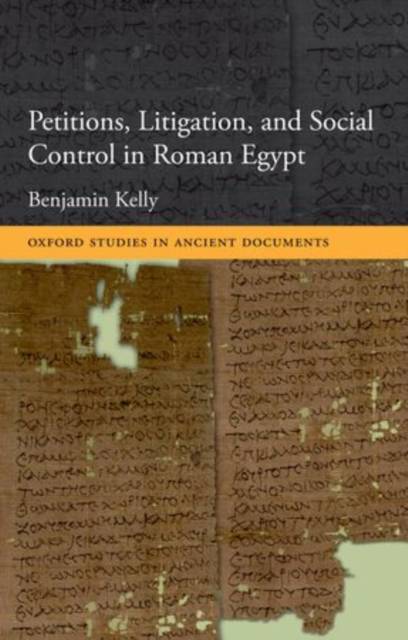
- Afhalen na 1 uur in een winkel met voorraad
- Gratis thuislevering in België vanaf € 30
- Ruim aanbod met 7 miljoen producten
- Afhalen na 1 uur in een winkel met voorraad
- Gratis thuislevering in België vanaf € 30
- Ruim aanbod met 7 miljoen producten
Zoeken
Omschrijving
This book examines the contribution that petitioning and litigation made to the maintenance of the social order in Roman Egypt between 30 BC and AD 284. Through the analysis of the many hundreds of documents surviving
on papyrus, especially petitions, reports of court proceedings, and letters, Kelly focuses on how the legal system achieved its formal goals (that is, the resolution of disputes through judgments), and discusses in detail the contribution made by the litigation process to informal methods of social control. With particular emphasis on the roles that this process played in the transmission of political ideologies, in the maintenance of family solidarity, and in the fostering of 'private' mechanisms of dispute resolution, the book argues that although the legal system was less than successful when judged by its formal aims, it did have a real social impact by contributing indirectly to some of the informal mechanisms that ensured order in this province of the Roman Empire. However, arguing that, on occasion, one can also see petitioning and litigation being abused for the pursuit of feud and vengeance, Kelly also recognizes that the social impacts of petitioning and litigation were
multifaceted, and in some senses even contradictory.
on papyrus, especially petitions, reports of court proceedings, and letters, Kelly focuses on how the legal system achieved its formal goals (that is, the resolution of disputes through judgments), and discusses in detail the contribution made by the litigation process to informal methods of social control. With particular emphasis on the roles that this process played in the transmission of political ideologies, in the maintenance of family solidarity, and in the fostering of 'private' mechanisms of dispute resolution, the book argues that although the legal system was less than successful when judged by its formal aims, it did have a real social impact by contributing indirectly to some of the informal mechanisms that ensured order in this province of the Roman Empire. However, arguing that, on occasion, one can also see petitioning and litigation being abused for the pursuit of feud and vengeance, Kelly also recognizes that the social impacts of petitioning and litigation were
multifaceted, and in some senses even contradictory.
Specificaties
Betrokkenen
- Auteur(s):
- Uitgeverij:
Inhoud
- Aantal bladzijden:
- 448
- Taal:
- Engels
- Reeks:
Eigenschappen
- Productcode (EAN):
- 9780199599615
- Verschijningsdatum:
- 15/11/2011
- Uitvoering:
- Hardcover
- Formaat:
- Ongenaaid / garenloos gebonden
- Afmetingen:
- 218 mm x 150 mm
- Gewicht:
- 754 g

Alleen bij Standaard Boekhandel
+ 427 punten op je klantenkaart van Standaard Boekhandel
Beoordelingen
We publiceren alleen reviews die voldoen aan de voorwaarden voor reviews. Bekijk onze voorwaarden voor reviews.











